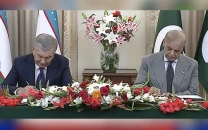Going beyond the Indus Waters Treaty
The difference between Kashmir and the water issue is that the latter is an existential issue.

Some might argue that the IWT has performed very well between India and Pakistan for the past 50 years. It has survived three wars. However, there is an underlying reason why this treaty has been so popular on both sides. The treaty promotes passive aggressiveness between the two nations, which is precisely what the establishment requires to maintain its status quo. It creates fear among the Pakistani population, which is based on India ‘stealing our water’. The rhetoric becomes uncontrollable when it gets into the hands of non-state actors whose purpose is to depict India as having cruel intentions.
Similar to other phenomena in the world, change is the only constant in managing trans-boundary waters. Change management requires a shift in the paradigm: The way we understand the river basin, its people and their livelihood. Water is a finite, a freely flowing resource that should not be divided by geopolitical boundaries. A regional approach is required in maintaining the prosperity and dominance of the mighty Indus. Article VII of the IWT mentions ‘Future Cooperation’ which, inter alia, discusses efforts in the future to jointly optimise the potential of the Indus River system. Very little attention has been paid to the joint observation of discharge, seismicity etc and the potential joint engineering works to augment storage, produce power and better moderate floods.
Surely, a trust deficit exists between the two riparian. Experts suggest that advance information to the lower riparian (Pakistan) about planned interventions such as dams and barrages, and their timely filling, can bridge these issues. However, this seems hopelessly unlikely, given recent events such as the meeting on the Wullar Barrage where the Indian delegation walked out of the room in the middle of the session. We cannot depend on a few state actors to decide the fate of relations between the two countries, instead we should work towards track-II diplomacy. One area where collaborative work should be urgently undertaken is on ground-water aquifers, especially near the border areas of Pakistan and India. The IWT only considers sharing of surface water discharge from the rivers and overlooks groundwater abstraction. A study conducted by the International Union for Conservation of Nature, using analysis from Nasa’s Gravity Recovery and Climate Experiment found that the aquifers of Pakistan are going to be affected with the disproportionate abstraction of groundwater in India. It concludes that “the issue of trans-boundary groundwater with India has to be addressed and an addendum has to be negotiated between basin states for inclusion in the IWT.” The 1994 Israel-Jordan treaty can help us learn manageable ways of dealing with both ground and surface trans-boundary water.
First it was Kashmir, now it is water. The difference between Kashmir and the water issue is that the latter is an existential issue. Therefore, the consequence of bringing water to a pedestal on India-Pakistan relations can have devastating effects on regional security and prosperity. We need to work closely with our neighbours in order to share this resource, rather than divide it. I find it necessary to cite Ramaswamy Iyer’s (Indian water policy expert) view on the Alternative Water Policy — he states: “The best way of avoiding conflicts is for the upper riparian (India) to adopt a cautious and minimalist approach to such interventions, undertake them where absolutely necessary with due regard to the interests of the lower riparians (Pakistan), provide advance information to the latter about plans for intervention, consult them at all stages on possible impacts and take care to avoid significant harm or injury to them.”
Published in The Express Tribune, July 16th, 2011.



















COMMENTS
Comments are moderated and generally will be posted if they are on-topic and not abusive.
For more information, please see our Comments FAQ